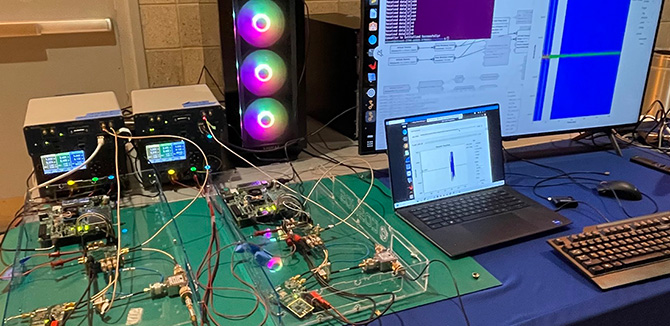Demonstrating a Wideband Real-time Adaptive Full-duplex Radio
Professor Igor Kadota and collaborators at Columbia University earned first place in the ACM SIGCOMM Student Research Competition
Traditional wireless communication systems — including Wi-Fi, 4G, and 5G — are half-duplex, meaning that transmitters take turns when communicating in the same frequency band.
Full-duplex (FD) wireless enables simultaneous transmissions on the same frequency band, thereby increasing data rates and reducing latency, without utilizing additional resources. The main challenge associated with FD wireless is the strong, time-varying, and environment-specific self-interference signal, or echo, that needs to be suppressed to the noise floor.
 Northwestern Engineering’s Igor Kadota and a team of Columbia University researchers earned first place in the graduate category for their demo “Experimentation with Wideband Real-Time Adaptive Full-Duplex Radios” at the 2023 ACM Special Interest Group on Data Communication (SIGCOMM) Conference Student Research Competition, held last month in New York City.
Northwestern Engineering’s Igor Kadota and a team of Columbia University researchers earned first place in the graduate category for their demo “Experimentation with Wideband Real-Time Adaptive Full-Duplex Radios” at the 2023 ACM Special Interest Group on Data Communication (SIGCOMM) Conference Student Research Competition, held last month in New York City.
Kadota joined Northwestern in September as an assistant professor of electrical and computer engineering at the McCormick School of Engineering following a stint as a postdoctoral researcher at Columbia University, where he worked with paper coauthor Gil Zussman. Additional coauthors include Alon Simon Levin, Sasank Garikapati, Bo Zhang, Aditya Jolly, Manav Kohli, Mingoo Seok, and Harish Krishnaswamy.
This demonstration is part of the FlexICoN project which spans domains including wireless networks, integrated circuits, and computer engineering.
“We demonstrate for the first time a real-time adaptive FD radio that suppresses the time-varying self-interference signal to the noise floor across a wide bandwidth of 50 MHz,” Kadota said. “Moreover, we use two FD radios to create a wireless communication link and showcase the superior FD data rates.”
Each FD radio consists of a circulator-based antenna interface, a switched-capacitor delay-line-based configurable radio-frequency integrated circuit (RFIC), a field-programmable gate array (FPGA) that dynamically optimizes the RFIC configuration in real-time and can adapt to environmental changes in under 0.3 seconds, and a software-defined radio (SDR) transmitting Wi-Fi like packets. The FD radio design is based on an RFIC implementation that is suitable for small-form-factor devices.
“This is one of my first projects focusing on optimization algorithms that can adaptively reconfigure communication systems in response to environment changes,” Kadota said. “I believe that the resilience of communication systems in adverse environments is important, especially for emerging mission-critical applications such as autonomous vehicles and smart cities.”
The team aims to continue this research and plans to investigate reinforcement learning-based algorithms for adaptive reconfiguration of RFICs and integrate their FD radios in the remotely accessible NSF PAWR COSMOS testbed, thereby allowing the broader research community to experiment with FD wireless.
“This research award from ACM SIGCOMM, which is the flagship conference in the area of data communications, highlights the importance of this topic and makes me even more motivated to continue developing customized algorithms for adaptive configuration of integrated circuits,” Kadota said.
Kadota’s research interests include modeling, analysis, optimization, and implementation of next-generation communication networks, with an emphasis on advanced wireless systems and time-sensitive applications. His research group aims to contribute to the development of the future wireless networks that will enable emerging applications including the Internet of Things, smart-city intersections, and shared augmented reality. He earned a PhD from MIT, where he was advised by Eytan Modiano in the Laboratory for Information and Decision Systems (LIDS).

